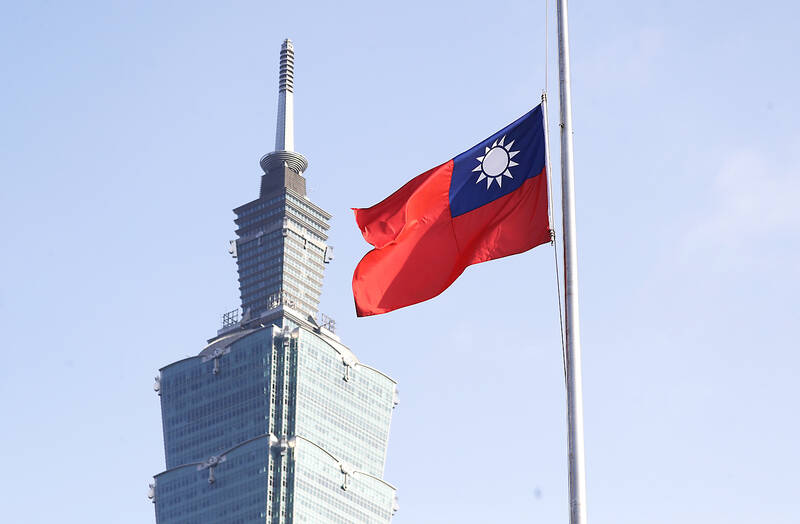“Why does Taiwan identity decline?”a group of researchers lead by University of Nevada political scientist Austin Wang (王宏恩) asked in a recent paper. After all, it is not difficult to explain the rise in Taiwanese identity after the early 1990s. But no model predicted its decline during the 2016-2018 period, they say.
After testing various alternative explanations, Wang et al argue that the fall-off in Taiwanese identity during that period is related to voter hedging based on the performance of the Democratic Progressive Party (DPP). Since the DPP is perceived as the guardian of Taiwan identity, when it performs well, that identity rises, and more people tell pollsters that they are “Taiwanese only.”
However, “the unique cross-strait context creates the opportunity for Taiwanese people to choose from the identity portfolio,” since “Chinese” exists as an alternative. Hence, they argue that when the DPP is perceived as failing, the public hedges, and shifts its identity to a more mixed identity (but, I might add, still Taiwan-centered).

Photo: Chen Yi-kuan, Taipei Times
ASSAULT ON TAIWANESE IDENTITY
This means that the Chinese Nationalist Party’s (KMT) attacks on the DPP are both political moves common in any democracy and assaults on the Taiwan identity. Since the New Power Party (NPP) failed to provide a viable progressive alternative party, and the Taiwan People’s Party (TPP) has turned into a shadow KMT, at present there is no alternative for the DPP to share its solitary guardianship of the Taiwanese identity.
The Taiwan identity is also bound up with Taiwan democracy. Former Hon Hai Precision Industry Co (鴻海精密) chairman Terry Gou (郭台銘) years ago famously sneered “Democracy doesn’t put food on the table.” At the time the comment provoked a firestorm, partly because it touched on a core truth: for most ordinary Taiwanese the democratic period has not been an economic success. For a nation that came of age as a “miracle” economy, this may be a grave threat to the DPP, democracy and the Taiwan identity.

Photo: AP
A recent paper in Competition & Change by Tat Yan Kong and Yin-wah Chu on rising income inequality and regime security in Taiwan describes the situation. Drawing on famed economist Thomas Picketty’s findings they note that between 1990 and 2020, the top 10 percent share of pre-tax income “increased from 37.0 percent to 48.1 percent, which was much more rapid than [South] Korea’s 32.0 percent to 34.5 percent, Germany’s 32.6 percent to 37.4 percent, and even the liberal United States 39.8 percent to 44.4 percent.” Growth of democracy has been accompanied by factories running off to the People’s Republic of China (PRC), stagnant wages and the emergence of thousands of zombie firms.
Although the rise in inequality in Taiwan has been accompanied by a trickle of welfare spending, the authors observe that the “mild redistributive outcome of social welfare benefits paled in the face of sharp income increase among the wealthiest members of the society.”
Both major parties, the KMT and the DPP, courted business with a variety of “reforms” after 2000 that ended up benefiting big business and the wealthy. Meanwhile Taiwanese firms that had gone to the PRC in search of subsidies, lax regulation and cheap, controlled labor moved on to Indonesia or Vietnam, and did not return.
Taiwan’s excellent income equality, a legacy of the export prowess of its small and medium enterprises (SMEs), soured as the share of SMEs in the export economy fell. Large firms, with access to policymakers in Taiwan and in the PRC, benefited the most from the investment in the PRC. They also benefited from the various development policies of both major parties.
The 2020-22 experience of COVID-19 exacerbated these issues. A 2022 survey by CPA Australia showed that “fifty-two per cent of small businesses nominated COVID-19 as a major negative factor in 2021, up from 45 per cent in 2020. However, 38 per cent also said it was a major positive influence on their business.”
The big winners were export firms and tech businesses, the survey said, while hospitality firms suffered. Note that this poll suffers from survivorship bias: this “majority” consists of businesses that made it through both years of pandemic and hung around long enough to complete the survey in 2022. Pandemic business losses remain a sore point with the electorate.
21ST CENTURY DEMOCRATIC EXPERIENCE
The “democratic experience” of the 21st century is a downward spiral of small firms, from manufacturing SMEs to night market stalls, coupled with rising income inequality, and poor prospects for the young, impacting voters who might otherwise vote DPP.
Given all this, does Wang et al’s conclusion hold? Their data turned out to be a temporary downturn — in the well-known poll of the National Chengchi University (NCCU) Election Study Center, “Taiwanese” identity had indeed fallen to 54 percent in 2018 from a high of 60 percent, but it quickly rebounded and stood at 63.4 percent by the end of last year, compared to 31 percent for “Taiwanese-Chinese.”
The criticism of the DPP record, much of it disinformation originating in the PRC, has not resulted in further “hedging” by voters. Quite the opposite: despite the daunting economic problems facing Taiwan, local identity continues to solidify. Moreover, except for that short period, the proportion of voters identifying as “Taiwanese” continues to broadly rise over time, irrespective of the state of the economy.
Last year the 94 percent for whom being Taiwanese is central to their identity voted to give the TPP, then a rising potential third force, the deciding vote in the legislature and handed the TPP presidential candidate 26 percent of the vote. Voters are quite confident in their identity, and the voting for the legislature, the party list and the president shows they vote strategically. This suggests that the linkage between DPP success and Taiwan identity has weakened. Should an alternative Taiwan-centered party rise and remain stable, the DPP could lay down its burden of guarding Taiwan identity, and we could have actual Taiwan-centered politics.
Perspicacious Taipei Times writer Donovan Smith last week contended that Taichung mayor Lu Shiow-yen (盧秀燕), now a rising star in the KMT, is aiming at the 2028 presidential election by positioning herself as a moderate centrist.
“She has consciously staked out a position as being both moderate pan-blue and strong on defense,” he wrote, adding that Lu had even used the DPP slogan “Resisting China and protecting Taiwan (抗中保台)” in response to the PRC live-fire military exercises that Beijing claimed were in response to then-US Speaker of the House Nancy Pelosi’s visit to Taiwan.
Could the voter confidence in the Taiwan identity that gave the TPP 26 percent of the presidential vote give a centrist positioned KMT candidate like Lu enough support to vault her into the presidency?
Notes from Central Taiwan is a column written by long-term resident Michael Turton, who provides incisive commentary informed by three decades of living in and writing about his adoptive country. The views expressed here are his own.

The People’s Republic of China (PRC) invaded Vietnam in 1979, following a year of increasingly tense relations between the two states. Beijing viewed Vietnam’s close relations with Soviet Russia as a threat. One of the pretexts it used was the alleged mistreatment of the ethnic Chinese in Vietnam. Tension between the ethnic Chinese and governments in Vietnam had been ongoing for decades. The French used to play off the Vietnamese against the Chinese as a divide-and-rule strategy. The Saigon government in 1956 compelled all Vietnam-born Chinese to adopt Vietnamese citizenship. It also banned them from 11 trades they had previously

Jan. 12 to Jan. 18 At the start of an Indigenous heritage tour of Beitou District (北投) in Taipei, I was handed a sheet of paper titled Ritual Song for the Various Peoples of Tamsui (淡水各社祭祀歌). The lyrics were in Chinese with no literal meaning, accompanied by romanized pronunciation that sounded closer to Hoklo (commonly known as Taiwanese) than any Indigenous language. The translation explained that the song offered food and drink to one’s ancestors and wished for a bountiful harvest and deer hunting season. The program moved through sites related to the Ketagalan, a collective term for the

As devices from toys to cars get smarter, gadget makers are grappling with a shortage of memory needed for them to work. Dwindling supplies and soaring costs of Dynamic Random Access Memory (DRAM) that provides space for computers, smartphones and game consoles to run applications or multitask was a hot topic behind the scenes at the annual gadget extravaganza in Las Vegas. Once cheap and plentiful, DRAM — along with memory chips to simply store data — are in short supply because of the demand spikes from AI in everything from data centers to wearable devices. Samsung Electronics last week put out word

The central government sets the nation’s environmental strategy and directs the push for net zero. It proposes laws and decides how most tax dollars are spent. The country’s local governments aren’t powerless, however. They draft local ordinances, assign manpower to carry out inspections, and — a recently-published assessment of environmental governance at the city/county level makes clear — have their own priorities. On Dec. 24, the Taiwan Environmental Protection Union (TEPU, 台灣環境保護聯盟) released its latest Municipal and County Government Sustainable Governance Evaluation Report. After analyzing 99 metrics, the NGO declared that the environment-related policies and implementation of Kaohsiung City, Tainan City